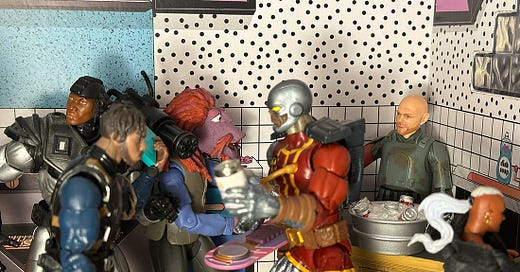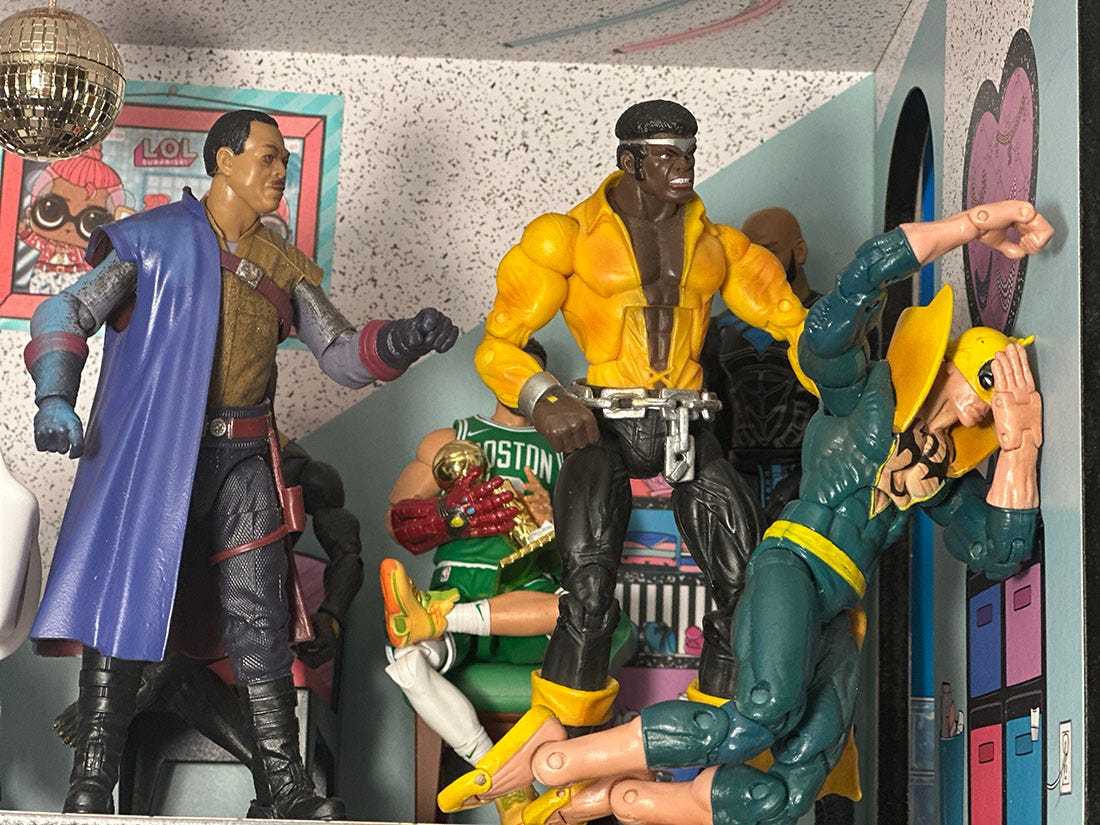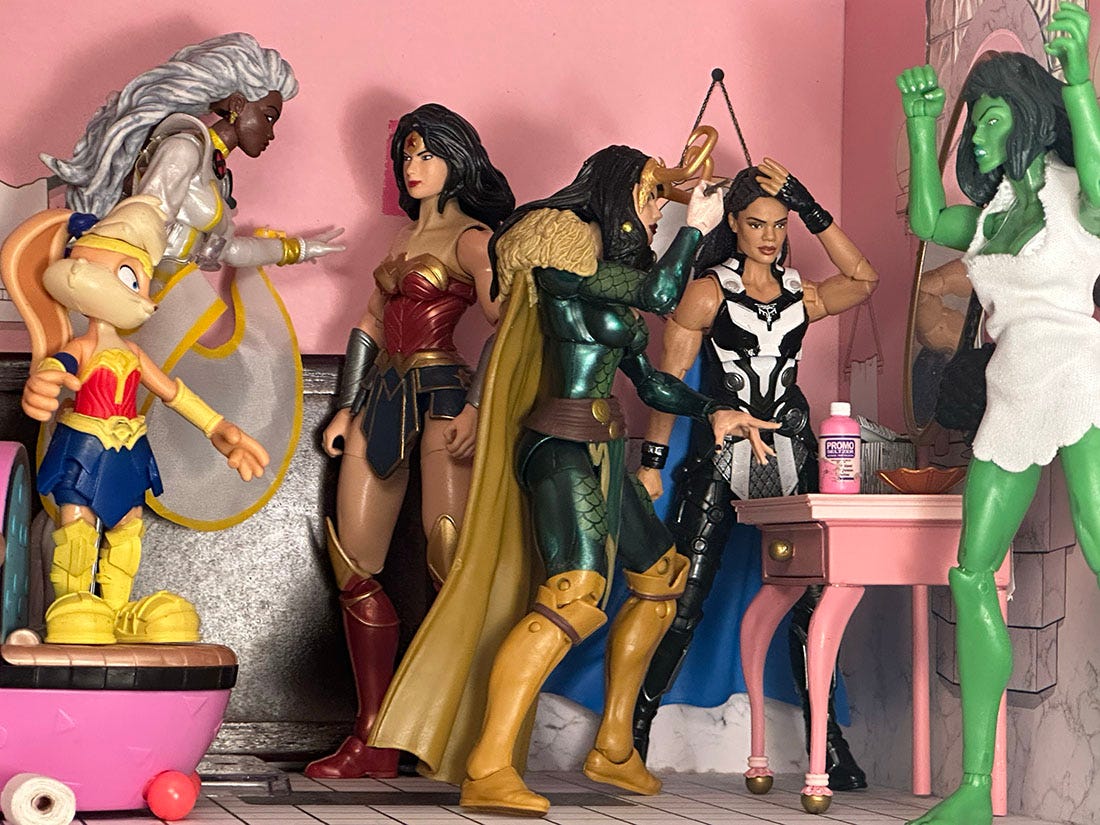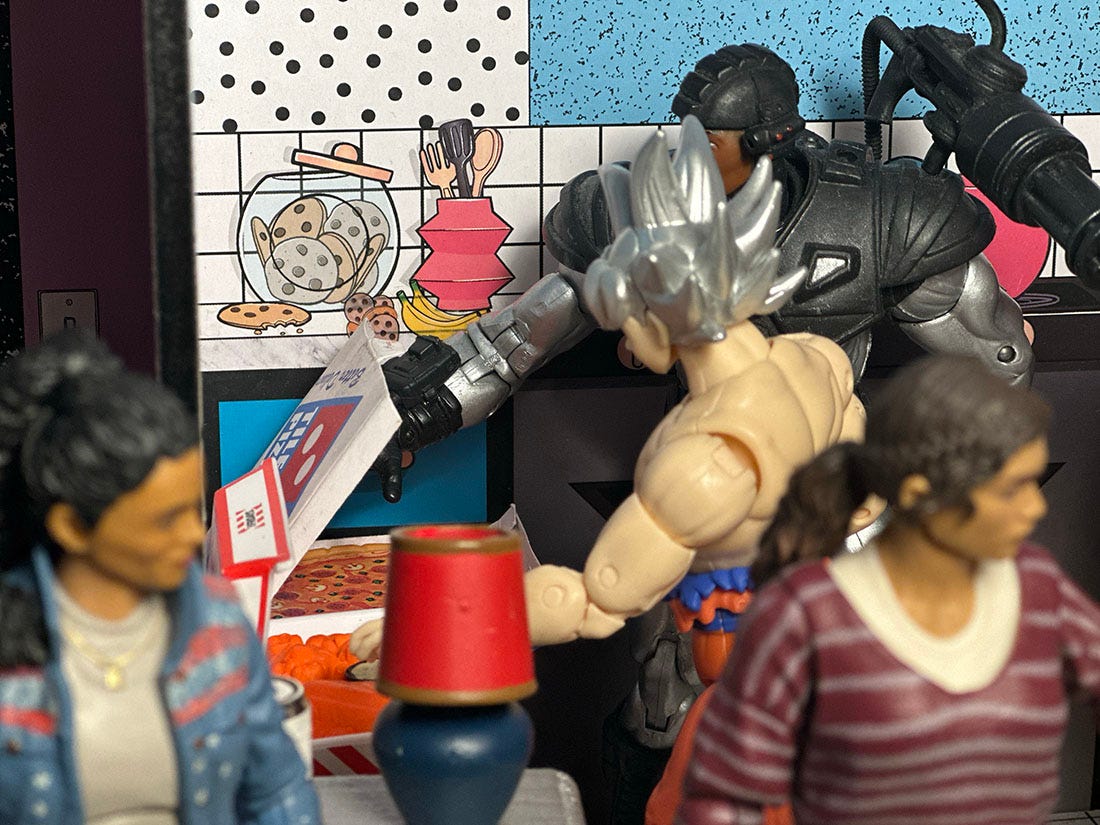Eventually, I learned what was up with my brain, and through a road I am sure we will revisit again I learned to take my meds and take care of my particular needs. After 2020 changed everything, a lot of my life changed, including relationships and routine. This changed the way I was used to feeding the part of myself that we’ve been discussing here at length. Merrily settled down, I stopped going out as much, which short-circuited some of the means through which I’d gotten used to currying approval. I basically stopped writing about music, largely because in my feelings of self-betrayal a doubt in the authenticity of my perspective took root, disqualifying me by my own standards. I’d do anything in my power not to be an overreaching white again.
All my life, because of my life, I’ve wanted to be a meaningful contributor to conversations about race, because that would feel important. That could help. But as soon as a “national dialogue” surfaced, it was undone, and I proved incapable. Whether by the well-meaning or ill-intentioned, far too much feels dumbed down or commodified or wickedly warped towards malfeasance. For me, a cynicism has taken hold. I realize now that I’d spent my life a utopian, awaiting that prophesied day when we could all finally get along. I was as sure that it would come as I was sure of my own place among the good graces. I’d believed Obama about the arc of time bending towards justice, but now I was wracked with doubt. And, again, my fragile ego was at its heart—after all, if even a person with a history such as I cannot be trusted, when wartime comes, then wherefor hope? What horizon brings promise?
There’s a song by a 1970s soul group, Brute Force, called “Some Kind of Approval.” A few years back I became obsessed with it, for its unrelenting assault on, in my interpretation, image-conscious allies, or hippies in its day. Instead of being champions of justice or equality or common humanity because it is the right thing to do so, the lyrics accuse the listener of aligning themselves with the cause for the affirmation, the access, the reward. But, there’s hope. Because “If you do what’s right, you’ll be free from approval.” That is to say, it’s not that these false friends are doing the wrong thing, behaving badly, but because they have not examined their underlying motivations for doing what they do, they are still at a remove. In waiting to be praised, they defeat themselves and undo their own aims at solidarity.
I came into this song through a friend after the frenzy of 2020, and listened to it pretty religiously for a spell. It feels instructional, like a hard lesson that requires the teacher be willing to appear cruel in order to ably deliver its in-truth empathetic message. It did not affirm a feeling I already had—it gave me new marching orders. Change, it said, or be outside righteousness.
The song helped me realize why I was so upset by the meager offerings of racial solidarity offered by my fellow whites. Of course there was the part where it infringed on my monopoly on what we now call wokeness—that was the easiest failing to spot, if not remedy. It wasn’t simply that their efforts felt underbaked, though that was upsetting too, the same way the Concord kids in FUBU outfits had upset my fragile sense of identity and community in the corner of the cafeteria lo those decades ago. What really drove me wild was the idea that they, that we, were all posting fucking BLM memes because we felt bad. About ourselves and our complicity. What a meager motivation.
But even that, I knew, was not why I raged online as I did. That was attributable to my ultimate hubris.
My great sin was that I felt I knew that these people, trying their best as they were, did not love Black lives in the same way I did. After all, I’d been to their weddings. Because, in my hunt for some kind of approval, private though it had been, I’d been tallying score.
Those people I loved and cared for were my motivation for screaming traumas on my feed. I did it, I thought, so that they would not have to. I did it because I thought it was my responsibility to do so. And, ultimately, I did it because I thought it would earn the approval of the people whose meant so much to me. It was, again, an imbalanced equation.
The fact is, I seek Black approval in this life because Black people have been nothing but a joy to me. We may share a world, but it meets us differently, and so too do we walk it. From coworkers to casual conversations with strangers to indispensable confidants, seeking to meet them with grace helped sculpt me, helped me contextualize myself in our world, and yes has helped me feel a little better than some aspects of the uncaring horde because sometimes you get what you give. Even though it is outside me, I craved the divine communication of the silent, knowing nod between folks—the exchange of reassurance that ultimately said, “I’m alright. And you’re alright.”
But to speak these thoughts and desires aloud is to surrender them to the possibility of poison. Every single relationship with Black folks I’ve enjoyed, from passing to lasting, carried with it a responsibility. A mutual do-no-harm pact. And, I’ve realized, a hidden tax on my part.
It’s unfair, but my heart knows that I often put too much on a stranger when I’m particularly kind and friendly. I’m asking for a response. Most of the time, people are more than glad to offer back what you give them, but that doesn’t mean they aren’t just being nice.
All my life, this love and luxury has been a joy with hint of responsibility. I’ve feared the corruption and that I would become it. I knew part of this path came from giving things a name. If I ever said something like, “I love Black people,” and meant it, I’d have to confront how they each and all felt in hearing me say it. I’d have to be open to the rejection of being turned away, unwanted.
But despite never saying it, I still had to reckon with being perceived in this way, as an ally or what have you. I still had to try and come up with context for myself, a framework of self-understanding. And, as you can tell, that proved difficult.
My lack of control and composure summer 2020 fully ruined me, robbed me of the innocence I’d traded on for so long. But it didn’t deprive me of my predisposition towards making friends with Black folks. It just made me more wary of my own motivations, and especially of my sense of exceptionalism. It didn’t make me less of who I am, but it lessened my pride in it.
I wish the rise in attention for things like allyship, diversity-equity-and-inclusion endeavors, and “wokeness” had given me peace, reassurance that what mattered to me mattered to the world, but it had the opposite effect. The whole conversation felt like an all-too-convenient shortcut, a commodification of what’s closer to a spiritual journey than a ready-made corporate training module. It got some Black people paid, which is good, but I’m dubious that it truly bridged divides, or helped anyone feel more welcome or understood.
I agree of course with the undergirdings of all these cultural mores, but when they come from a horde of white voices, I feel doubt. They may believe this now, but they were not so aware of the world when we and it were younger. I remember. And then I’m wracked by a second thought—maybe I’m just still not willing to surrender the exclusive identity my life was a fight for.
To my dumb ass, these measures seem dedicated toward assimilation, when the real ones have revolution on the mind.
Make Space for Yourself
I’m going to resist the urge to delineate each and every time a Black relationship or passing dynamic has made me feel validated. And I’m not going to admit how much I relished being the lone colonizer invited to the early Black Panther screening. I’ll just say, things have changed. When I hear Kendrick Lamar exclaim “They not like us!” these days, I can’t help but feel a mite displaced. I find I count myself outside the circle.
I think a lot about loneliness. For a long time, it was sort of my muse—the idea that I had a special brand of it, a language I alone spoke and could speak to the world. It’s not that I’m an especially solitary figure, anything but really. I guess it’s just that “alone in a crowd” thing. What I’m saying is that I think most everyone with depression is cool, I guess.
(One downside about my outlook is that if in my estimation you are ignorant to that part of the human experience, I’ve got little to no time for you. Note that I never called myself virtuous or fair.)
I was talking to the more knightly member of my high school troika about this story, because I’ve been very nervous about sharing these experiences and observations, and he made mention of that dichotomy between comfort and discomfort. What do you do when you’re in a state of discomfort? What do you learn to do? Is that transferable? Can it become a strength? If you feel lonely in a crowd, can that teach you to seek out when others might feel that way? If you become practiced at that, at embracing the part of you that’s loneliest so that you can help or at least seek to combat loneliness in others, is that something you can take pride in? Pride from shame? Willingness born of fear? Can loneliness make you… popular?
Fuck if I know. I just want to make other people comfortable so that I can be comfortable.
In recent years a lot of people I respect greatly have commenced a campaign against wanting to be liked, or accepted. It’s a weakness, as characteristics go, is the thinking. In some ways it’s an absurd thing to suggest—I mean, we all want to be liked, my instincts tell me, on some level. Like the man said, can’t we all just get along?
But to need to be liked, to heat-seek it, to contort ourselves in its pursuit, to accommodate others whether they have earned that effort or not, that is a more troublesome value.
A lot of this, I’ll meekly venture, has to do with our ideas of an integrated society and what it should look like, whose responsibility it is to help us get there. Better to be self-reliant, less pitched towards the outside validation of institutions like the newspapers for which I once worked. That world I’d become accustomed to was outmoded, defunct, obsolete. Which calls into question what roles there are to play.
It’s just a feeling. Guards are up. Wanting to be liked by strangers is a trait to be doubted. Acceptance is earned before it is given. And it makes sense. We are a more openly hostile society than we were even 10 years ago. Division is emboldened. People should take care of themselves first.
But it’s all made me lonely, and full of doubt. It’s like I’m a warrior for the last war, a product of a dream of integration from the last millennium that today billows like smoke. There’s no winning the world, like I wanted. There are factions, too many to reconcile. The walls feel high. Or maybe I’ve just lost my ability, my confidence, to scale them.
I’m older now than I once was and I can recall with immediacy a world that was different, with different rules and different commonly understood truths. Earlier in life, I thought nothing of my outgoing Black friends who were so spectacular at making me or anyone they met feel divinely good about ourselves. Even when we were close, I took for granted whatever might have motivated them to win people over with effusion. Even when I cared for them, I was blind to the idea that parts of themselves that they shared were born of instinct for survival. In comforting others to feel more comfortable in ourselves, I forgot just how alike we were.
I’ve done my surviving, too. For me the last few years were a stew of tragedy and triumph. My sense of self became impossibly fractured and reconstituting it’s taken a lot of medical-grade superglue and more time than has yet passed. My life, though, became more stable and rewarding, especially as those who love me were given permission not to worry so much. But things changed, I changed. There were identities that I wasn’t as comfortable wearing anymore, after a few peeks behind my own curtain.
One tragic reflection is more shameful than I’ve felt equipped to confront. In my life, I worry I’ve used Black people. I’ve made friends with them to feel less alone, to feel of use, to find solidarity outside of the parts of the room that made me feel like shit. My lack of intent in this exploitation is no adequate excuse, as far as I’m concerned. I thought I was better than other white folks and in this brave new world I’ve come to fear I’m worse—more at fault, more culpable. Because I should have known better.
But that said, what’s to be done about it? I thought it had been an untraceable crime, to prop myself up via proximity to Black cool. And while I’ve been a user, I’ve sought to provide, as well. You can’t be one of the good ones without on some level trying to be one of the good ones. I wish I’d been able to do it without the kind of unspoken pride I nursed, like I had a special relationship or was in some way anointed. But I was foolish, eager and unknowing, ignorant to the far reach of corruption.
I’m just trying to be a good friend to the world, as best I know how. For me, that means taking on the challenges posed by the cultural fissure at the heart of white racism towards Blackness. The reason I frame this conversation as I have, around my culpability, is because I feel responsible for my own misguidedness. And that’s what I’d frame it as—misguided. If it feels as though there aren’t a wealth of great examples to follow in this world, it’s probably because people would rather trade on cool than try and talk about it. Everything is farce, Chet Hanks style. I was careless, ultimately. I was imbalanced. I was fearful.
I don’t quite know why the fear remains so prominent to me. I do sometimes worry that certain friends will drop or forget about me; it’s what helped me to identify some of these issues. I don’t know anything about “white guilt,” but I know shame—and as burdensome as it is, it can help you to be thoughtful, considered, careful.
So that’s why I confess. Not because I am uniquely guilty, but because I’d rather share than harbor the feelings. I’m even grateful for my doubt, ultimately. It’s been my greatest shield against the kind of betrayal I fear most.
I guess I just always felt lucky to know any Black people, to whatever degree they each permitted. For whatever reason, I’ve often been made to feel understood and appreciated and seen for my intentions. At times, I’ve become completely consumed with trying to honor or repay that. In arrogance, I’ve wanted to remake the world. It’s driven me to madness, at times, I must admit. But then I encounter friends and teachers and both who, ahead of me on the road to peace as they are, gently insist upon me that the first rule of fighting for something is survival. Martyrs make for great teaching tools, but it gets more messy and complicated when you’re aspiring to be one. I think that’s something we whites do a little too freely—nail ourselves to our posts to differentiate from the masses. To me, it’s a nice idea, but a little self-aggrandizing. Then again, power through humility is a lesson I am still early in the process of coming to know.
I guess I’ll have to learn to live with my contradictions, as well as any consequences for daring to speak them aloud. And speaking of disjointed belonging, there’s a phrasing that goes around that I feel a real warmth for even though it is decidedly not for me.
“I love my Blackness, and yours,” they say.
“I love that for you!” is my nice white lady affirmation to the sentiment, responding without being spoken to.
Obviously, I can’t insinuate myself to the statement, it’s neither for nor about me, but I have love for it. Maybe how I don’t really count myself Catholic but find “Peace be with you,” “And also with you,” to be truly holy words. The love of it, the purpose the words impart, the understanding they bridge, it clasps meaning.
Unlike you, racial matters make me insecure. They make me bite my tongue and second guess and fear the judgement of strangers as readily as people who I know to love me. I’m white. I’m not asked to be brave every day. I’m not expected to navigate people’s implicit biases, their mass-media projections, their infernal guilt complexes. There’s no newly accredited national holiday of celebration that reckons with my freedom. No grand binding narrative. Precious little bond born through commonly understood struggle.
I don’t want to say the wrong thing, so I say nothing. Which is exactly the opposite of how I grew up.
I’ve been protective because of what I feared I have to lose—pride. The vain idea that I’m better than anyone, special, protected from white supremacy. I’m realizing, though, that much as I’d love to CTRL-Z that particular quality, I need some of that pride to get by, to hold to who I am. Because I am proud—of my life, my community, my story and my intentions within it. It doesn’t mean I haven’t misstepped. Just that I’ve got to own it.
And what if I have no place, so what? What then? Where do I belong? To myself, I suppose. And wherever I fit in.
What I know is that I don’t want my issues pertaining to race to be Black people’s problem anymore. I want to be a zero-gravity entity in their presence, to demand no comfort, to remove myself from the weight of our collective problems, or those foisted by us onto them. Raise my voice and I’ve made it about me, is my worry, and my need to extricate myself from the perils of our socially deficient society. We’ve said in times past that the overriding goal should be togetherness, and I still like that idea, but I worry about how ably we earn that. We ask too much, demand too much accommodation while offering too little of our own.
Maybe you feel I think too much about this stuff, Black/white relations. Maybe it’s counterproductive to shine so much light on something and expect it to be bonded as result. Maybe, by sharing all these private truths, I’ll have lost your trust, as I feared at the outset. But sometimes, you’ve got to be long-winded to be specific.
I think for now my goal is just to wish each other, wish Black folks, peace. Peace from the problems that have yet to heal over the centuries. Peace from our demons. Peace from being our spectacle and our comfort, our entertainers and our caretakers, the mature ones in the room. Our responsible voting bloc. Let there be enough peace that then our togetherness can be bereft of turmoil, underlying or above. Then, hopefully, we can better share and, most importantly, cede power.
I wish I could have gotten all this across more cleanly, and much, much more succinctly. But simplifying the role of race in our lives is, I think, impossible. I had a lot to say, and hope I didn’t lose you.
Don’t get me wrong—I absolutely still want to be friends. Just don’t let me make everything about me.
What’s good with you?








